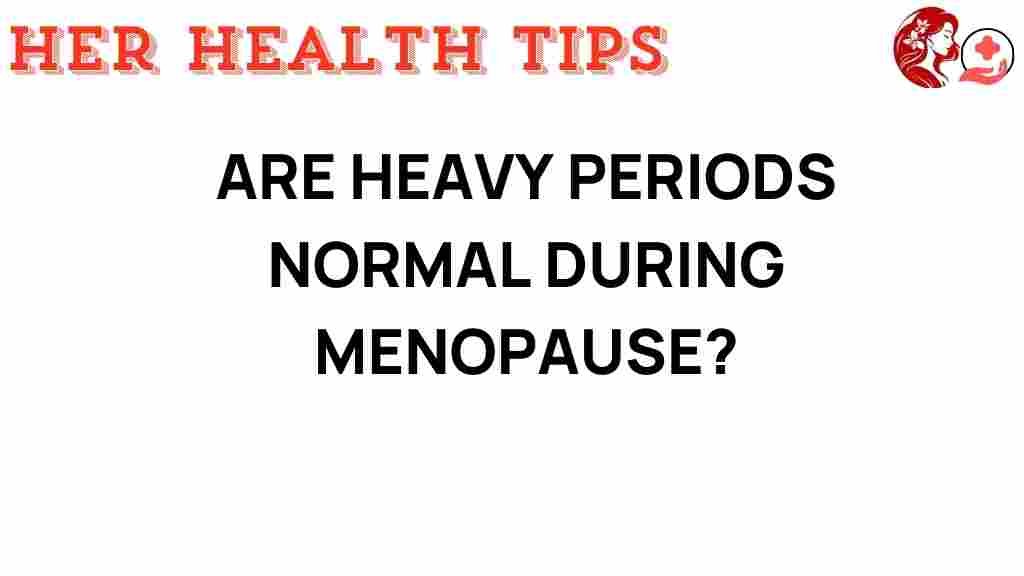Are Heavy Periods During Menopause a Cause for Concern?
Menopause is a natural transition in a woman’s life, typically occurring in her late 40s to early 50s. This phase marks the end of menstrual cycles and fertility, primarily due to hormonal changes. However, many women experience heavy periods during menopause, which can be concerning. Understanding these changes is crucial for managing women’s health during this period.
Understanding Heavy Periods
Heavy periods, also known as menorrhagia, refer to excessive menstrual bleeding, which can be both physically and emotionally taxing. During the transition to menopause, known as perimenopause, women may notice significant changes in their bleeding patterns. These changes can include:
- Longer menstrual cycles
- Heavy bleeding that soaks through one or more pads or tampons every hour for several consecutive hours
- Periods lasting more than a week
- Clots larger than a quarter
As hormonal changes occur in the body, it’s not uncommon for women to experience fluctuations in their menstrual cycles. This can lead to the question: are heavy periods during menopause a cause for concern?
The Role of Hormonal Changes
During perimenopause, estrogen and progesterone levels fluctuate significantly. These hormonal changes can affect the menstrual cycle in various ways, leading to heavier periods for some women. Here’s how:
- Estrogen Dominance: As ovulation becomes irregular, estrogen levels may remain high, while progesterone levels drop. This imbalance can lead to an overgrowth of the uterine lining, resulting in heavier bleeding.
- Irregular Ovulation: In perimenopause, ovulation may not occur regularly. When it does, the uterine lining can thicken, causing heavier bleeding when it eventually sheds.
- Age-Related Changes: The body’s response to hormones can change with age, impacting menstrual cycles and bleeding patterns.
Health Concerns Related to Heavy Periods
While heavy periods during menopause can be a normal part of the transition, they can also indicate underlying health concerns. It is essential to pay attention to your body and consult a healthcare provider if you experience:
- Severe pain during periods
- Bleeding after menopause has begun
- Bleeding between periods
- Symptoms of anemia, such as fatigue or shortness of breath
These symptoms could signify conditions such as fibroids, polyps, or even endometrial cancer. Therefore, it is crucial to monitor your symptoms and discuss any changes with your doctor.
Step-by-Step Process to Manage Heavy Periods
If you are experiencing heavy periods during menopause, here are steps you can take to manage your symptoms effectively:
1. Track Your Symptoms
Keeping a detailed record of your menstrual cycles and bleeding patterns can help identify any irregularities. Note the following:
- Length of your cycle
- Duration and heaviness of bleeding
- Any accompanying symptoms (e.g., cramps, mood changes)
2. Consult with Your Healthcare Provider
Schedule a visit with your doctor to discuss your symptoms. They may perform tests, such as:
- Pelvic exams
- Ultrasounds
- Blood tests to check hormone levels and anemia
3. Explore Treatment Options
Your healthcare provider may recommend various treatment options depending on the cause of your heavy periods. These may include:
- Hormonal Therapy: Birth control pills or hormone replacement therapy can help regulate menstrual cycles and reduce bleeding.
- Medications: Nonsteroidal anti-inflammatory drugs (NSAIDs) may help reduce heavy bleeding and alleviate pain.
- Minimally Invasive Procedures: Options like endometrial ablation can reduce or stop bleeding by destroying the uterine lining.
4. Lifestyle Adjustments
Making healthy lifestyle choices can also aid in managing heavy periods. Consider:
- Maintaining a balanced diet rich in iron to prevent anemia
- Regular physical activity to promote overall health
- Stress management techniques, such as yoga or meditation
Troubleshooting Common Concerns
Women experiencing heavy periods during menopause may have additional concerns. Here are some common issues and how to address them:
Heavy Periods and Anemia
Heavy bleeding can lead to anemia, a condition where you lack enough healthy red blood cells. Symptoms may include:
- Fatigue
- Weakness
- Shortness of breath
If you suspect anemia, discuss with your healthcare provider about blood tests and dietary adjustments to increase iron intake.
Emotional Impact of Heavy Periods
Heavy periods can lead to emotional distress, affecting your quality of life. Here are ways to cope:
- Talk to a friend or counselor about your feelings.
- Practice relaxation techniques such as meditation or deep breathing.
- Consider support groups for women experiencing similar challenges.
When to Seek Help
If you notice any of the following, seek medical assistance promptly:
- Bleeding that lasts longer than a week
- Severe pain or cramping
- Symptoms of shock, such as fainting or rapid heart rate
Conclusion
Heavy periods during menopause can be concerning, but they are often a normal part of the hormonal changes occurring in a woman’s body. By understanding your menstrual cycles and being aware of the symptoms and potential health concerns, you can take proactive steps to manage your women’s health during this transitional phase. Always consult with a healthcare provider if you experience significant changes in your bleeding patterns or have concerns about your symptoms.
For more information on women’s health and menopause, consider visiting this resource. Remember, you’re not alone in this journey, and support is available.
Stay informed, stay healthy, and take charge of your well-being during menopause!
This article is in the category Reproductive and created by HerHealthTips Team

1 thought on “Are Heavy Periods During Menopause a Cause for Concern?”